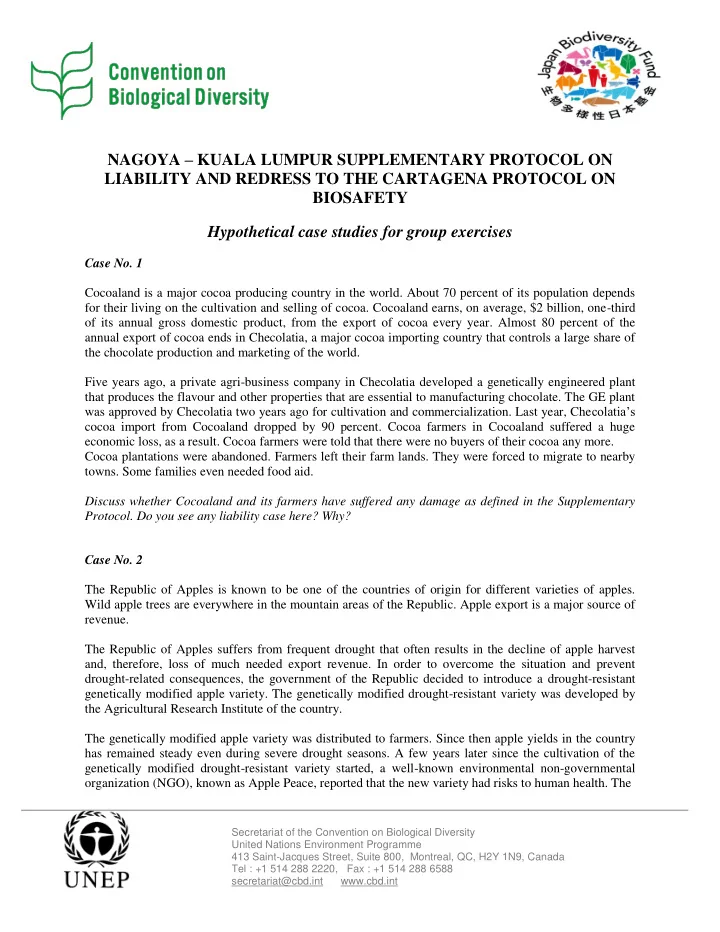

NAGOYA – KUALA LUMPUR SUPPLEMENTARY PROTOCOL ON LIABILITY AND REDRESS TO THE CARTAGENA PROTOCOL ON BIOSAFETY Hypothetical case studies for group exercises Case No. 1 Cocoaland is a major cocoa producing country in the world. About 70 percent of its population depends for their living on the cultivation and selling of cocoa. Cocoaland earns, on average, $2 billion, one-third of its annual gross domestic product, from the export of cocoa every year. Almost 80 percent of the annual export of cocoa ends in Checolatia, a major cocoa importing country that controls a large share of the chocolate production and marketing of the world. Five years ago, a private agri-business company in Checolatia developed a genetically engineered plant that produces the flavour and other properties that are essential to manufacturing chocolate. The GE plant was approved by Checolatia two years ago for cultivation and commercialization. Last year, Che colatia’s cocoa import from Cocoaland dropped by 90 percent. Cocoa farmers in Cocoaland suffered a huge economic loss, as a result. Cocoa farmers were told that there were no buyers of their cocoa any more. Cocoa plantations were abandoned. Farmers left their farm lands. They were forced to migrate to nearby towns. Some families even needed food aid. Discuss whether Cocoaland and its farmers have suffered any damage as defined in the Supplementary Protocol. Do you see any liability case here? Why? Case No. 2 The Republic of Apples is known to be one of the countries of origin for different varieties of apples. Wild apple trees are everywhere in the mountain areas of the Republic. Apple export is a major source of revenue. The Republic of Apples suffers from frequent drought that often results in the decline of apple harvest and, therefore, loss of much needed export revenue. In order to overcome the situation and prevent drought-related consequences, the government of the Republic decided to introduce a drought-resistant genetically modified apple variety. The genetically modified drought-resistant variety was developed by the Agricultural Research Institute of the country. The genetically modified apple variety was distributed to farmers. Since then apple yields in the country has remained steady even during severe drought seasons. A few years later since the cultivation of the genetically modified drought-resistant variety started, a well-known environmental non-governmental organization (NGO), known as Apple Peace, reported that the new variety had risks to human health. The Secretariat of the Convention on Biological Diversity United Nations Environment Programme 413 Saint-Jacques Street, Suite 800, Montreal, QC, H2Y 1N9, Canada Tel : +1 514 288 2220, Fax : +1 514 288 6588 secretariat@cbd.int www.cbd.int
P a g e | 2 NGO claimed that according to information it received from a local hospital about a dozen people fell ill after eating the new apples. No laboratory test results were presented in the report. The hospital confirmed that there was no laboratory data supporting the claim except the allegations by the patients themselves. Immediately after the publication of the report, several countries banned all imports of apples coming from the Republic of Apples. Such trade disruption began to cost the country enormously. The economic damage has been well over 30 percent of the GDP, the first year only, and it is expected to be so as long as the import ban by the apple importing countries remains in place. Discuss whether this case falls under the scope of the Supplementary Protocol. Do you think the Republic of Apples has suffered any damage as defined in the Supplementary Protocol? Do you see any liability case here? Why? Case No. 3 The Democratic Republic of Butterflies is rich in different species of butterflies that are not found elsewhere in the world. Thousands of tourists flock to the country every year to watch the butterflies. Butterfly tourism is a major source of revenue for the Republic. The country is also a well-known destination for Lepidopterists, scientists who study butterflies. The number and variety of butterflies has been declining over the past ten years. Studies indicated that the decline coincided with the introduction of a pest-resistant genetically modified rose flower in large parts of the neighbouring country, Flower-Coast. Flower Coast is famous for vastly growing a variety of flowers. The genetically modified rose flowers were introduced into Flower Coast by a local company known as Ultimate Rose. The company imported the seedlings from Rose-tech, a transnational florist company based in the country known as Yugostan. After years of studies and trials, it was confirmed that the genetically modified roses grown in Flower Coast have cross-bred, through natural gene flow, with the rose flowers grown in the neighbouring country, the Republic of Butterflies. The pest resistant trait of the genetically modified roses introduced and grown by Flower Coast has passed to the flowers in the Republic of Butterflies. It was found out that the trait has targeted the larvae of the butterflies in the Republic of Butterflies and as a result the population of butterflies has declined dramatically and certain endemic species were also lost forever. Discuss whether the Democratic Republic of Butterflies has suffered any damage as defined in the Supplementary Protocol. Do you see any liability case here? Why? What response measures do you envisage? Who do you think is the operator that the competent authority in the Republic of Butterflies may require to take the response measures? Case No. 4 Mr. Bean is a coffee farmer in Bunnakia, a country known for its organic coffee export at the international market. Mr. Bean was looking for an improved variety of coffee seeds that could withstand a perennial disease that has been attacking his coffee plants. He finally came across information that a genetically modified coffee variety that is resistant to the disease was available in Nicotine Republic, a country known for its specialization in developing different varieties of coffee seeds.
Recommend
More recommend